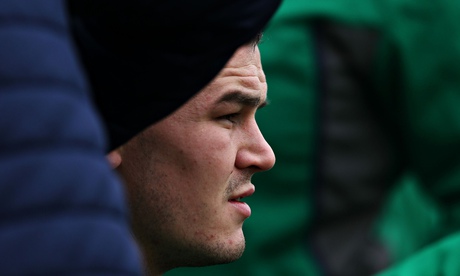
This year's Six Nations is the most keenly contested in the tournament's 14-year history, with four teams locked on four points two rounds from the end, but Ireland's tilt at a first title since 2009 suffered a blow on Thursday night with the revelation that their Lions fly-half Jonathan Sexton could be out for up to six weeks.
Sexton, who left Twickenham on Saturday with a hand in a splint after damaging thumb ligaments during the defeat to England, is one of Ireland's pivotal players and their campaign last year was derailed when he suffered a hamstring injury in the first half against England.
Ireland went on to suffer defeats against Scotland and Italy and only avoided the wooden spoon because of a superior points difference to France. Sexton's replacement then, Ulster's Paddy Jackson, could take over again, but a year ago he struggled both as a playmaker and as a goal-kicker. Leinster's Ian Madigan is the other option.
The severity of the injury remains unclear, however. Sexton returned to Paris this week where he was assessed by his club, Racing Métro. "He has a thumb ligament injury and will be out of action for between 10 days and six weeks," said the club's head coach, Laurent Labit, ruling the fly-half out of the Top 14 match against Castres at the weekend.
Ireland, however, issued a statement of their own, suggesting Racing's assessment was overly pessimistic. "The Ireland medical team have had a consultant hand specialist review Jonny and his scans," said the IRFU. "The damage sustained does not warrant surgery and if Jonny continues his current rate of improvement we would be confident that he will be available for selection against Italy."
Ireland are leading the Six Nations on points difference from England, Wales and France, with the head coach, Joe Schmidt, focused on a strong performance against the Italians in Dublin. A resounding victory over the bottom team would very probably leave them needing any sort of victory in Paris, where they have won only once since 1972, to finish top.
"We have to make sure that we are fully focused," Schmidt said. "An expectation that we will beat them by a margin of 10 or 20 points presents a real danger and it will be anything but easy. They beat Ireland and France last year and there is a danger in looking too far ahead."
Two of Ireland's rivals, England and France, suffered long-term injuries to key players in the last round, the former losing Billy Vunipola and the latter Wesley Fofana. Wales, in contrast, hope to have two of their Lions, Alun Wyn Jones and Jonathan Davies, available again.

